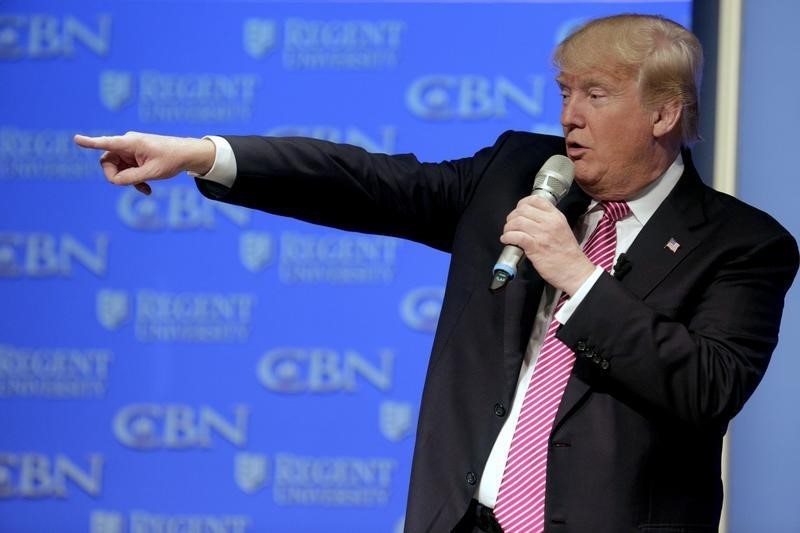(Bloomberg View) -- President Donald Trump has been determined to confront the U.S.’s European allies on every issue of importance, from trade to climate change to the multilateral deal with Iran. As politicians and publics on this side of the Atlantic become increasingly wary, it’s worth asking whether he really wants allies at all.
After the unsuccessful visits of the French president, Emmanuel Macron, and the German chancellor, Angela Merkel, to Washington last week, Trump has given Europe another month’s respite from punitive steel and aluminum tariffs. He expects European Union countries to agree to export quotas instead. Why the Trump administration would want that is anybody’s guess: Tariffs would at least yield some revenue for the U.S., while quotas would only result in abnormal profits for the exporters since prices would inevitably go up. But tariffs or quotas, it’s clear European leaders can’t get any traction with Trump.
Then there’s the likelihood -- confirmed by Macron after his talks with Trump -- that the U.S. will withdraw from the Iran nuclear deal and reimpose sanctions on Iran. The presentation of Prime Minister Benjamin Netanyahu of Israel on Monday was clearly meant to strengthen Trump’s resolve to do so. Netanyahu’s forceful way of making a point that doesn’t necessarily agree with the data (the materials obtained by Israeli intelligence concern Iranian weapons plans from before the deal) should appeal more to Trump than the German and French leaders’e measured arguments or top EU diplomat Federica Mogherini’s sober reminder that Iran has been fully compliant with its 2015 commitments.
The mockingly bromantic body language of Trump’s interactions with Macron and his infuriating condescension toward Merkel send the same message: Give me what I want or don’t bother to show up. The latter option would be a scary leap for European politicians, who have treasured the transatlantic alliance since the late 1940s. But the European public and thought leaders might feel differently.
The favorability of the U.S. (the country, not the administration) is at 46 percent in France and 35 percent in Germany, according to the Pew Research Center. That was the lowest since 2008, when the reputation of the U.S. hadn’t recovered from the Iraq invasion and the financial crisis was gathering steam. No such momentous events are taking place now, but there’s Trump. Germans, according to a poll released last month by Forsa, one of the top polling organizations in the country, overwhelmingly consider him a greater danger to world peace than Russian President Vladimir Putin, and that’s the case even among the conservative supporters of Merkel’s party.
In March, Pew Research released a poll of European and American thought leaders (mostly foreign-policy experts), which showed that the Europeans believed Trump is about as likely as Putin, and far less likely than Merkel, Macron, U.K. Prime Minister Theresa May or even Chinese leader Xi Jinping to do the right thing in world affairs. Most of these experts -- Americans and Europeans alike -- believe the relations between the U.S. and Europe are getting worse in every respect.
Europe may be beholden to the U.S. for security, but most Europeans see security as a policing problem, not a geopolitical one, so it’s hard to explain to them exactly what threats the U.S. is averting.
If Trump’s “America First” approach, on full display during the president’s joint press conference with Merkel, is dictated by domestic considerations, and so is, as Macron has suggested, Trump’s stance on the Iran deal, U.S.-bashing can be as popular and as politically lucrative in Europe. Merkel and Macron have been disciplined about not playing this card, including in their recent election campaigns. But for an example of how easy it would be, one needn’t go any further than the interview Monday of Guenther Oettinger, the EU budget commissioner and Merkel’s political ally, with Germany’s ZDF news channel.
“We import jeans from the U.S.,” Oettinger said, “but there are more European products that are attractive to Americans.” He went on: “In one sector they have an advantage -- the digital sector, social media, big data. But as far as real industry goes, there are few American products that are attractive to Europeans.”
This economic pride -- which isn’t completely misplaced, as Europe has a trade surplus with the U.S. in most industrial goods, as well as in food -- could easily be combined with criticism of the U.S. security policy, especially if Trump wrecks the Iran deal. Any increase in Middle East instability can be linked easily to increasing immigration to Europe, though only only extreme-left and extreme-right parties have make this connection so far. But if centrist politicians continue to be publicly snubbed by Trump, that sort of argument could migrate to the mainstream.
Trump is probably merely intent on keeping his promises to voters. But if he had a conscious foreign-policy strategy it would look like a bet that Europeans -- at least the moderate, reliable ones, the likes of Merkel and Macron -- will absorb the petty humiliations and fall into line because, as he put it at the news conference with Merkel last week, the U.S. is, “A very strong, very strong country.”
That is far from a sure bet. Macron and Merkel appear to be hoping to wait out Trump. But if he wins re-election in 2020 or if his successor adopts a similar attitude, the next electoral cycle in major EU nations may turn out to be far more anti-American than the last one was, simply because public and expert opinion indicates there are political gains to be picked up on this path. This is how long-standing alliances are undermined.
